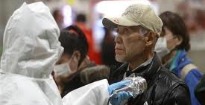Radiation Found in Food Products
 The Wall Street Journal reports:
The Wall Street Journal reports:
Raising concerns over possible contamination from the stricken Fukushima Daiichi nuclear plant, Japan's health ministry said Saturday that an abnormal amount of a radioactive material was detected in spinach grown about 110 kilometers (about 70 miles) northeast of Tokyo.
The ministry also said that an abnormal amount of the material, called iodine-131, was detected in milk from a dairy farm about 50 kilometers away from the plant.
"This is the first time ever that an abnormal amount of radioactive material has been detected in food in Japan," said ministry official Ryusuke Hagiwara.
Chief Cabinet Secretary Yukio Edano said that the amounts detected in the milk and spinach would not immediately affect human health. Even so, concerns over possible food contamination mark a serious setback in Japan's attempts to contain its worst-ever nuclear accident as it threatens to widen the economic impact of the disaster to Japan's declining farming industry.
Also Saturday, Japan's science ministry said that small amounts of a radioactive substance not usually present have been detected in tap water in Tokyo and five nearby prefectures, but it said the amounts are too small to pose a threat to human health. The ministry started monitoring tap water for radioactive material Saturday, and will continue to check it every day.
In raw milk samples collected from a farm in the town of Kawamata in Fukushima prefecture, up to 1,510 becquerel per kilogram of iodine-131 were detected, about five times the limit of 300 becquerel per kilogram set by law.
"This will be a huge blow to dairy farms all over Fukushima," said Yukimitsu Sato, a spokesman for the prefecture's dairy farm cooperative, which represents about 60% of local dairy farms, including the one in Kawamata.
The prefecture had not shipped milk for consumption since the earthquake, and the health ministry's announcement came just as the cooperative was preparing to begin shipping again.
"We were just starting to see a ray of hope," said Mr. Sato, adding that the cooperative was not told about the radioactivity tests.
Click here to read more.

